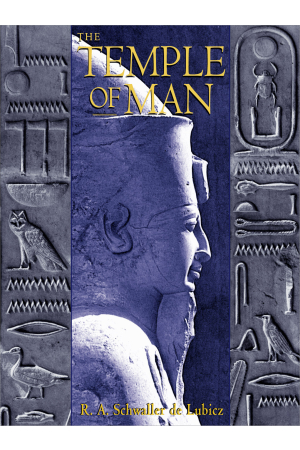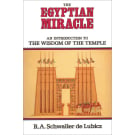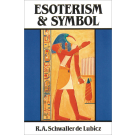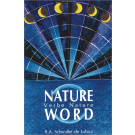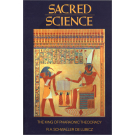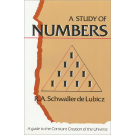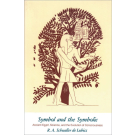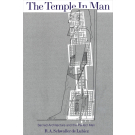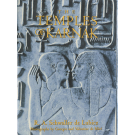The Temple of Man
- Pages: 1088
- Book Size: 9 x 12
- ISBN-13: 9780892815708
- Imprint: Inner Traditions
- On Sale Date: November 1, 1998
- Format: Hardcover Book
- Illustrations: 400 b&w illustrations
His study finds the temple to be an eloquent expression and summary--an architectural encyclopedia--of what the Egyptians knew of humanity and the universe. Through a reading of the temple's measures and proportions, its axes and orientations, and the symbolism and placement of its bas-reliefs, along with the accompanying studies of related medical and mathematical papyri, Schwaller de Lubicz demonstrates how advanced the civilization of Ancient Egypt was, a civilization that possessed exalted knowledge and achievements both materially and spiritually. In so doing, Schwaller de Lubicz effectively demonstrates that Ancient Egypt, not Greece, is at the base of Western science, civilization, and culture.
To understand the temple of Luxor, twelve years of field work were undertaken with the utmost exactitude by Schwaller de Lubicz in collaboration with French archaeologist Clement Robichon and the respected Egyptologist Alexandre Varille. From this work were produced over 1000 pages of text and proofs of the sacred geometry of the temple and 400 illustrations and photographs that make up The Temple of Man.
The Temple of Man is a monument to inspired insight, conscientious scholarship, and exacting archaeological groundwork that represents a major contribution to humanity's perennial search for self-knowledge and the prehistoric origins of its culture and science.
The Temple of Man
Volume 1
Publisher's Preface xiii
Translators' Acknowledgments xv
Translators' Preface xvii
Preface xxv
Introduction 1
Part 1
The Doctrine of the Anthropocosmos Elements 14
Chapter 1 * Consciousness and Irreducible Magnitudes 30
Chapter 2 * Symbolique 47
Chapter 3 * Anthropocosmos 61
Chapter 4 * Pharaonic Thought 72
Part 2
Mathematical Thought
Chapter 5 * Foundations of Pharaonic Mathematics 88
Chapter 6 * Pharaonic Calculation 126
Part 3
The Master Builders' Grid: Pharaonic Mathematics Applied
Chapter 7 * Pharaonic Trigonometry 190
Chapter 8 * The Canevas: Living Architecture of Number 228
Chapter 9 * The Cosmic Principle of Volume 250
Chapter 10 * Pharaonic Cubits 276
Chapter 11 * The Human Canon 310
Chapter 12 * The Royal Apron 346
Chapter 13 * The Axes 355
Part 4
The Architecture of the Temple:
Themes
Chapter 14 * The Edwin Smith Surgical Papyrus 374
Chapter 15 * The Diadem 432
Chapter 16 * The Joints: Guides for Reading 444
Chapter 17 * The Covered Temple: The Head 448
Chapter 18 * Sanctuary V 458
Chapter 19 * Crossing 476
Chapter 20 * The Zodiac 479
Chapter 21 * The Hindu Temple 498
Chapter 22 * The Mystic Temple: A Meditation 504
Volume 2
Part 5
The Pharaonic Temple
Chapter 23 * The Architectonics of the Pharaonic Temple 514
Chapter 24 * Preface to the Presentation of the Architecture of the Temple of Luxor 519
Chapter 25 * The Temple of Luxor 524
Part 6
Plates, Legends, and Commentaries
Chapter 26 * Amun and Suti-Hor 532
Chapter 27 * General Views of the Temple of Luxor 535
Chapter 28 * The Growth of the Temple 569
Chapter 29 * A Colossus of the Temple 591
Chapter 30 * Joints and Pieces 639
Chapter 31 * The Mosaic Figure in the Foundation of the Temple 677
Chapter 32 * The Crown of the Skull 699
Chapter 33 * The Moon in the Haty 721
Chapter 34 * The Knees 737
Chapter 35 * The Bows 747
Chapter 36 * The Zodiac 761
Chapter 37 * The Master Builders' Grid 779
Chapter 38 * Transformations and Mutations 861
Chapter 39 * A Secret Sanctuary 885
Chapter 40 * The Axes of the Temple 905
Chapter 41 * Receiving and Giving 955
Chapter 42 * The Architectural Structure 977
Chapter 43 * Transparency and Transposition 991
Chapter 44 * Seth-Horus 1003
Appendix:
Comparison of Parts and Chapters in the English and French Editions 1022
List of Works Cited 1024
Index 1028
Jacob Needleman, author of Time and the Soul
"In The Temple of Man, renowned Egyptologist R.A. Schwaller De Lubicz offers an exhaustive study of the temple of Amun-Mut-Khonsu at Luxor. In over 1000 pages of text, illustrations and photographs, De Lubicz demonstrates the powerful spiritual and philosophical heritage of ancient Egyptian civilization."
Publishers Weekly
"Schwaller's grand synthesis reveals, once and for all, the full extent and significance of the knowledge of Ancient Egypt."
Parabola
"Le Temple de l'homme by Schwaller de Lubicz is an absolute must for all who are interested in the search for the truth about Ancient Egypt and its pivotal place in the unfolding of the cosmic drama and the human quest for immortality and spiritual perfection. For years we have all waited for an English translation. Here it is at last!"
Robert G. Bauval, author of The Orion Mystery: Unlocking the Secrets of the Pyramids and Message of the Sphinx
"Schwaller's text demands that it not be just read, but that it be 'thought along with.' His scientific writings contain poetic and spiritual insights that touch the soul . . . because true science, as he conceives it, is capable of generating those insights--indeed, it demands that they be generated."
Gnosis Magazine
"In my view, The Temple of Man is the most important work of scholarship of this century. R. A. Schwaller de Lubicz finally proves the existence of the legendary 'sacred science' of the Ancients and systematically demonstrates its modus operandi. It was this great science--based upon an intimate and exact knowledge of cosmic principles--that fused art, religion, science, and philosophy into one coherent whole and sustained Ancient Egypt for three thousand years."
John Anthony West, author of Serpent in the Sky
"Schwaller de Lubicz's great work, grounded in a remarkable insight into the science and philosophy of the ancient world, opens the way to a complete reappraisal of Egyptian civilization, revolutionizing our view of history."
In the first Renaissance, the Florentines went back to the knowledge of the ancient Greeks. In this, our planetary Renaissance, we return to the esoteric knowledge of the Ancient Egyptians. The research and intuitions of Schwaller de Lubicz should be placed alongside Evans-Wentz's recovery of the esoteric knowledge of Tibet.
William Irwin Thompson, author of At the Edge of History
"Schwaller de Lubicz is one of the major thinkers of the twentieth century--his greatness, alas, still not fully recognized, although readers who know Sacred Science and Symbol and the Symbolic treasure them as masterpieces. But his greatest and most massive achievement is The Temple of Man, surely one of the seminal works of the last half century. The news that it is to be finally published in English will delight all admirers of this highly original philosopher."
Colin Wilson, author of The Outsider and The Philosopher's Stone
"The Temple of Man will live, like statues of Ramesses, long after we and those who follow us have joined the pharaohs. This is an eternal work, just as Egypt is eternal. To enter the minds of the Ancient Egyptians through this door will lead any reader into an enchanted realm where form and structure have life, where stone breathes and perspires, and where the palpitating heart of traditional wisdom still throbs amongst the sands."
Robert Temple, translator of The Complete Fables of Aesop and
author of The Sirius Mystery
"The Temple of Man is a monumental product of intellect, scholarship, and exploration into the 'pharaonic mentality' of Ancient Egypt. There is no work more ambitious in seeking to render accessible the consciousness of a time and place remote from and extremely alien to our own. The sufficiently careful and aware reader can actually take on enough of the mindset being described as to arrive at states of consciousness unlike any experienced by contemporary people. It then becomes possible to glimpse that extraordinary 'mentality' which cast in Egypt a spell of luminous fascination still potent after thousands of years."
Robert Masters, author of The Way to Awaken and The Goddess Sekhmet
"An important addition to the library of any serious metaphysician."
Pythia Peay, Common Boundary
"The Temple of Man is an accomplishment of truly Herculean proportions. Nothing written in the past two hundred years, with the exeption of only one book, even approaches it in enormity of purpose, scope, subject matter, majasty and profundity. . . . One needs to learn to read this book and then immerse oneself in it. Were on to do this, and assuming diligence, sincerity, determination and some ingenuity by the reader, the outcome toward which all human life is aimed, the evolution of consciousness is assured."
Atlantis Rising
"An impressive, beautifully realized presentation that deserves consideration, discussion and debate. For those of you with interest in alternative approaches to ancient Egypt, The Temple of Man will be and important addition to your library."
KMT, 1998
"As complete an insight into the mind of pharaonic Egypt as will be found on paper. . . . Coming to the worldview from our mindset places serious damands on the reader. But, this book is both dizzying and transporting, offering the possibility of immersion in another world, cleansing the mind and clarifying the extent and the limitations of our own mental tools for grasping our world."
MKS, Whole Earth, 1998



